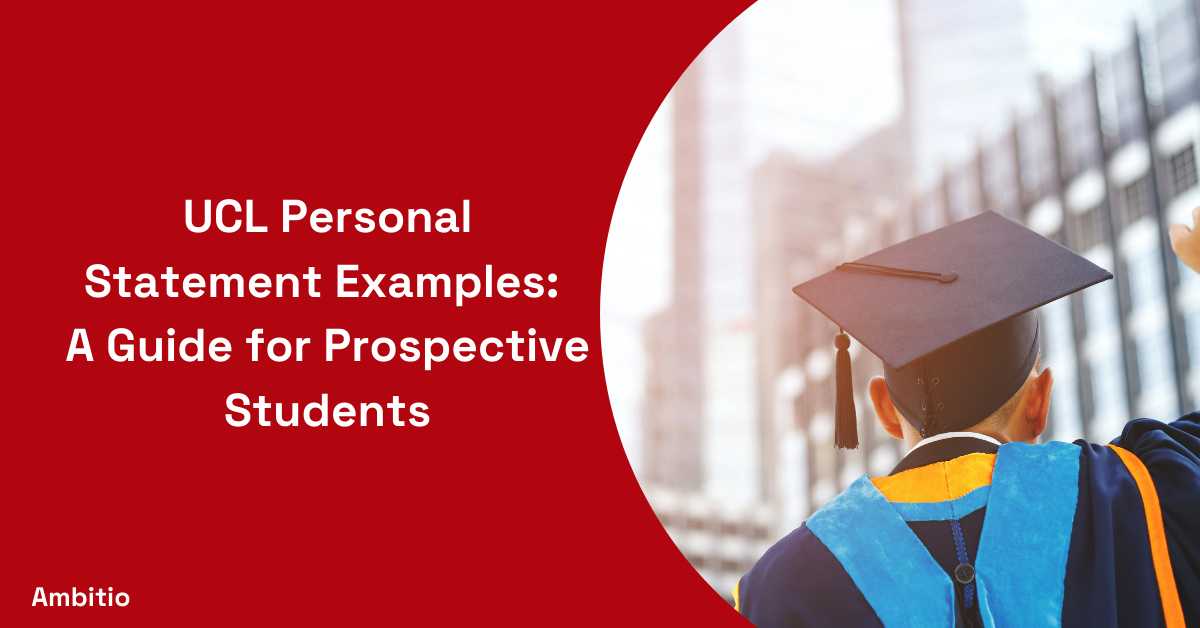6 March 2025
4 minutes read
UCL Personal Statement Examples: A Guide for Prospective Students

Key Takeaways
- UCL personal statement examples demonstrate how to structure a compelling narrative that aligns with UCL’s academic rigor and research focus.
- UCL personal statement examples highlight the importance of showcasing subject passion, critical thinking, and relevant experiences to stand out.
- UCL personal statement examples emphasize concise yet impactful storytelling, ensuring clarity, originality, and strong motivation for the chosen field.
Personal statements are very important when it comes to applying to university, particularly when applying to university colleges like University College London (UCL). They provide the window of opportunity for an applicant’s interests, purpose of study, and experience and help the admissions team sift through their suitability for the programme applied for. Potential students need to realize that a good personal statement is not a listing of achievements but an interesting narrative that demonstrates their intent to study.
Writing Your Personal Statement: Key Considerations
When writing your personal statement for UCL, you must be clear, well-structured, and authentic. It is challenging for most students applying to UCL to structure their statement well.

The following are important writing tips to help you write a good personal statement:
- Avoid Flowery Language: Clarity should take precedence over complex vocabulary.
- Showcase Relevant Work Experiences: Highlight experiences like shadowing a junior doctor or volunteering at a medical school.
- Demonstrate Communication Skills and Teamwork: The ability to convey ideas effectively is as important as technical expertise.
- Mention Extra-Curricular Activities: Universities appreciate students with diverse interests, whether it’s hockey or economic debates.
- Provide In-Depth Analysis: Simply listing achievements is not enough; reflect on how each experience has shaped your aspirations.
UCL Personal Statement Example (Medicine)
To understand what makes a strong UCL personal statement, consider the following example for a UCL medicine personal statement:
“From a young age, my fascination with science and the human body has driven me towards a career in medicine. Witnessing a junior doctor perform a procedure during my work experiences confirmed my desire to study medicine. Weeks later, my shadowing experience in a psychiatry department deepened my curiosity about the emotional and psychological aspects of human life. The sacrifice required in this field does not deter me; rather, it gratifies my aspiration to make a difference across the globe.”
This example effectively conveys the applicant’s passion and commitment while maintaining clarity.
Structuring Your UCL Personal Statement
A strong structure ensures that your UCL personal statements flow seamlessly. Below is an ideal format:
| Section | Purpose |
|---|---|
| Introduction | Hook the reader by expressing your fascination with science or medicine. |
| Academic Achievements | Highlight relevant A-level subjects, such as mathematics, biology, or a degree in economics. |
| Work Experience | Discuss shadowing, volunteering, or work experiences that shaped your career choice. |
| Extra-Curricular Activities | Showcase teamwork, leadership, and dedication beyond academics. |
| Conclusion | Reinforce your desire to work in the field and how UCL aligns with your goals. |
The Importance of BMAT for UCL Medicine Applicants
UCL requires applicants for medical school programmes to take the BMAT (BioMedical Admissions Test). Preparing for BMAT involves developing analytical skills and the ability to scrutinize scientific data. Prospective students should dedicate time to practice tests to enhance their performance.

Common Pitfalls to Avoid in Your UCL Personal Statement:
- Using Generic Statements: Saying “I want to study medicine because I like helping people” does not stand out.
- Lack of Structure: Your statement should flow progressively from one section to another.
- Exaggeration: Admission officers can detect insincerity, so keep your experiences authentic.
Studying at UCL: Why It Appeals to Students
UCL University is appealing to overseas students due to its rigorous study modules, potential for in-depth research, and excellent emphasis on collaboration. No matter if you aspire to read for an economics degree or pursue a degree in medicine, UCL is a campus that is stimulating and inspiring.
Top 10 Institutions Similar to University College London in the UK for Overseas Admissions
For those looking at alternatives to UCL, there are a number of other leading UK universities that offer world-class education, competitive salaries, and diverse academic opportunities.
Below is a list of the top 10 UK universities similar to UCL, as well as their average international tuition fees and graduate salaries.
| Rank | University | Average Tuition Fees (International) | Average Graduate Salary |
| 1 | University of Oxford | £37,000 – £48,000 | £45,000 |
| 2 | University of Cambridge | £24,000 – £63,000 | £42,000 |
| 3 | Imperial College London | £34,000 – £45,000 | £50,000 |
| 4 | London School of Economics (LSE) | £24,000 – £32,000 | £40,000 |
| 5 | King’s College London (KCL) | £20,000 – £40,000 | £35,000 |
| 6 | University of Edinburgh | £24,000 – £35,000 | £32,000 |
| 7 | University of Manchester | £19,000 – £32,000 | £30,000 |
| 8 | University of Warwick | £22,000 – £32,000 | £32,000 |
| 9 | University of Bristol | £20,000 – £30,000 | £31,000 |
| 10 | University of Glasgow | £18,000 – £28,000 | £30,000 |
The above institutions have similar academic reputation, research quality, and graduate employability to UCL, hence excellent options for prospective students.
Impact of Economic Problems on University Applications
Economic factors, such as fluctuating oil prices, can affect university finance and student opportunities. Students must take into account how external circumstances affect their education and professional prospects. Education in economic trends through UCAS materials and debate in institutions like Imperial can provide understanding of how economic dynamics shape higher education decisions.
Conclusion
An effective UCL personal statement must present your passion, highlight your background, and depict how you are the most appropriate candidate. For those applying to a biomedical program, mathematics, or a career in medicine, ensuring it is readable and actual will improve your chances of an offer from UCL. Spent some time revising your statement, and you will be off to learn at one of the world’s top universities.
So what are you waiting for? Join Ambitio Elite, schedule a call with our experts and give your study abroad journey a head start!
FAQs
What makes a strong personal statement for UCL admissions?
A strong UCL personal statement should demonstrate academic passion, critical thinking, and relevant experiences, aligning with UCL’s rigorous standards.
How long should a UCL personal statement be?
UCL follows the UCAS limit, which is 4,000 characters or 47 lines, ensuring clarity and conciseness.
What key elements should be included to impress UCL admissions officers?
A compelling statement should highlight academic achievements, subject enthusiasm, relevant skills, and future aspirations.
How can I tailor my statement to match UCL’s academic expectations?
Researching UCL’s course structure, referencing specific modules, and showcasing analytical skills can make your statement more aligned with UCL’s expectations.
Should I include extracurricular activities in my UCL personal statement?
Yes, but only if they relate to your chosen subject or demonstrate transferable skills like leadership, problem-solving, or research abilities.
How do successful applicants structure their UCL personal statements?
They typically follow a clear structure: introduction, academic background, relevant experiences, skills, and a strong conclusion reinforcing motivation.
What common mistakes should be avoided when writing a UCL personal statement?
Avoid clichés, vague statements, excessive personal anecdotes, and failing to link experiences to academic and career goals.

You can study at top universities worldwide!
Get expert tips and tricks to get into top universities with a free expert session.
Book Your Free 30-Minute Session Now! Book a call now




























